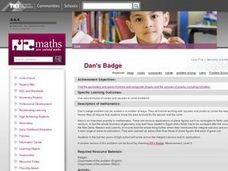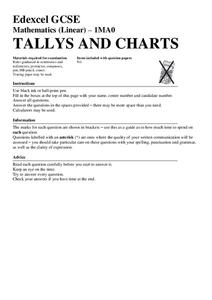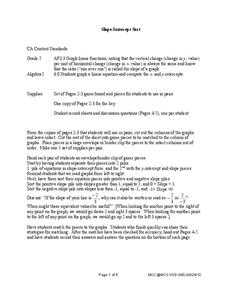Curated OER
Map Coordinates: Monkey Map
Here's an engaging, meaningful, and clever lesson on map skills for elementary schoolers. Pupils combine story writing with mapping skills to create an original piece of work. They utilize a worksheet embedded in the plan to guide them...
Curated OER
Comparing Values: Comparisons Between Musical Notation and Money
Students identify ways in which the principles and subject matter of other disciplines taught in school, specifically math, are interrelated with those of music.
Curated OER
Dan's Badge
Students solve a math problem using area formulas of circles and squares. They read and discuss the problem, analyze images of badges, reconstruct the badge from the problem using circles and rulers, and share the solution with the class.
Curated OER
Estimating Measurement
First graders estimate length and height of items. They read the story of Jack and the Beanstalk and discuss estimation of size. Students predict the length and height of figures. They use lines and numbers on the centimeter rod and tape...
Curated OER
Writing Takes Shape!
Students read The Greedy Triangle and discuss geometric solids. In this geometry lesson, students list the geo-solids in the world and create a graphic organizer to show where geo-solids exist.
Curated OER
Let's Make A Deal
Third graders make a picture money book. In this money lesson, 3rd graders read The Monster Money Book, discuss money terminology, watch a video on money and draw an example of the barter system. Students use the Internet to find...
Curated OER
Problems!!!
In this word problems worksheet, students read word problems about one person telling the truth and one telling a lie and they figure out which is which. Students complete 4 problems.
Curated OER
Counting Rabbits
You've heard of counting sheep, but what about counting rabbits? This is a fun way to approach data analysis with young mathematicians. Examining a chart, they see how many times James and his family saw rabbits in their yard over a...
Curated OER
Wisconsin Agriculture; Berry Bunch's Cherry Fast Facts
Students explore agriculture by researching Wisconsin's economy. In this cherry industry lesson, students read assigned text about the amount of cherries Wisconsin produces annually and the revenue it brings in to the state. Students...
Curated OER
Fun With Sorting and Classifying
Using a variety of activities, kindergartners explore sorting and classification. Learners engage in an online sorting activity, read books involving classification, and create their own class book. This is a marvelousway to explore this...
Curated OER
Principle of Art Balance
Reinforce a strong art vocabulary which can also apply to aspects of math and science. Kids read about various types of balance or symmetry found in art. They analyze three paintings based on vocabulary and read a how-to for creating...
Scholastic
Adding and Subtracting Ten
Developing fluency with basic addition and subtraction is fundamental to the success of all young mathematicians. This four-day lesson series begins with learners using ten-frames and hundreds charts to recognize patterns when adding and...
Balanced Assessment
Movie Survey
Movie preferences will get your classes talking! Individuals read a pie graph and construct a bar graph using the same information. They then answer questions specific to the data and sample size.
Concord Consortium
The Six Faces of Amzora
Here's a task that is out of this world! Given a description of a fictional cube-shaped planet, scholars answer a set of questions about the planet. They create a two-dimensional map and consider the distances between locations on the map.
Curated OER
Using Fact Families
For this math worksheet, students write two addition problems and two subtraction problems for each fact family. Students also write in the missing addition or subtraction sign and answer 6 questions about a word problem.
Curated OER
What's in the Bag?
Help your students identify the attributes of two-dimensional shapes. They read the book Round is a Mooncake, and use pattern blocks to sort shapes. Students sort shapes according to their attributes.
Curated OER
Introduction to Exponents
Problem solve using exponents. Pupils read One Grain of Rice: A Mathematical Folktale and write powers to represent amounts from the story.They compare actual solutions to their predictions and play a game to practice using...
Curated OER
Coloring Squares - Write the Word
Let's learn about squares. Youngsters complete this coloring worksheet with multiple objectives including printing practice, spelling, shapes, and colors. First, they trace the word green. Pupils color all the squares in a string of...
DK Publishing
Sentences #1 Worksheet
How many words are in this sentence? Emergent readers see how sentences are made up of whole words. They count the words in two simple sentences, writing the number in a box. Challenge them to read the sentence as they count, and observe...
Curated OER
Location on a Grid
Make coordinate pairs more engaging by having beginners color-code a grid based on given locations. The grid has numbers along the y-axis and letters along the x-axis, introducing them to the ordering of coordinate pairs with the x-axis...
Curated OER
Line Graphs
Let's take a look at Luis' bike ride! Scholars examine a line graph charting a 20-kilometer bike ride over the course of six hours. They answer six questions about the data requiring the understand the concepts of each axis and the line...
Mathed Up!
Tallys and Charts
After watching a brief instructional video, young mathematicians are put to the test. By completing and reading frequency tables, tally charts, and bar graphs, individuals show their understanding of how to interpret data.
Bowland
You Reckon?
Sometimes simple is just better. A set of activities teaches young mathematicians about using plausible estimation to solve problems. They break problems down to simpler problems, use rounding and estimation strategies, and consider...
West Contra Costa Unified School District
Slope-Intercept Sort
What's so special about slope? Pupils first match cards with slope and y-intercept to graphs of linear equations. They continue the lesson by matching equations in slope-intercept form to the same graphs.























